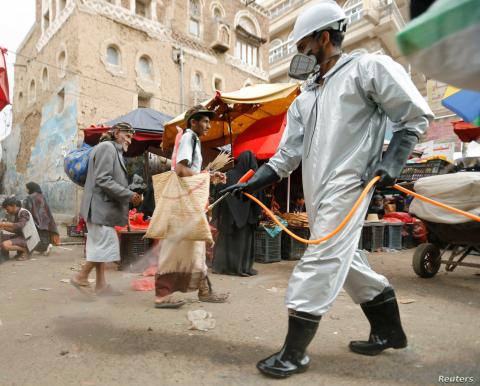The purveyors of death cough up loose change for Yemen


A so-called humanitarian aid conference for Yemen last week raised a paltry $1.35 billion, some $1 billion short of the target and less than half the $3.2 billion raised last year.
The Saudi monarchy, which has spent $5 to $6 billion per month for the last five years on a criminal war against Yemen, primarily fought from the air, pledged just $500 million. Riyadh insisted $200 million of its donation would be spent through Saudi aid programmes, not those sanctioned by the United Nations (UN). It later emerged that this was not new money but money that had been pledged earlier and not delivered.
The US, UK, Norway and Germany contributed most of the remainder, small change compared to the sales value of their weaponry—supplied to the Saudi Arabian military—that has devastated the Arab world’s poorest country.
Dr. Abdullah al-Rabiah, the head of the King Salman Centre for Relief and Humanitarian Aid in Saudi Arabia that co-hosted the virtual conference, ascribed the shortfall to the impact of coronavirus on national budgets, omitting to say that every one of the participants had made billions available to their own corporations and financial institutions, including their arms manufacturers.
Mark Lowcock, head of the United Nations Office for the Coordination of Humanitarian Affairs and formerly the most senior civil servant at Britain’s Department for International Development, delivered homilies to the virtual summit about the UN’s determination not to abandon Yemen’s long-suffering people.
Unless more money was raised, said Lowcock, Yemen “will face a horrific outcome at the end of the year”. He added, “Yemen is now on the precipice, right on the cliff edge, below which lies a tragedy of historic proportions.”
The irony of appealing to the very forces that had produced this “tragedy of historic proportions” seems to have escaped him and the world’s press reporting on a conference that served to absolve the major participants of their crimes.
It came as no surprise that the response to the aid appeal was a noxious combination of hypocrisy, indifference and bullying.
In March 2015, the venal House of Saud launched a military campaign to suppress the Houthi rebels, who had taken control of Sana’a, Yemen’s capital, and to reimpose the unelected puppet government of President Abd Rabbuh Mansur Hadi—who is now holed up in Riyadh. It formed a coalition with the UAE and several other Arab countries, all with divergent interests, to prosecute the offensive that was expected to yield speedy results.
While the Saudis have prosecuted the war by air, the UAE, operating out of its naval bases in the Red Sea and along Yemen’s southern coast, carried out a naval blockade of Hodeidah—Yemen’s principal Red Sea port. The UAE provided many of the ground troops, along with local or tribal militias operating in unstable and fluid alliances with different and opposing agendas, some backed by Riyadh and some by Abu Dhabi, until it pulled out of the war last year.
The five-year-long war, which has turned into several separate conflicts and a military quagmire, has led to the world’s worst humanitarian catastrophe for the civilians caught in the midst of this hellscape.
The Saudis’ 257,000 aerial strikes and the UAE’s naval blockade have caused the deaths of at least 230,000 civilians, both directly and indirectly as a result of hunger and disease and displaced some 3.6 million Yemenis. At least 14 million people are on the brink of famine, while 80 percent of the country’s 28 million people are reliant on food aid. Save the Children estimated last year that at least 75,000 Yemeni children under the age of five have starved to death since the onset of the war. The worst cholera epidemic on record has infected an estimated 1.2 million people and led to at least 2,500 deaths, while the recent floods have sparked a dengue fever outbreak in Hadramawt.
Hospitals and schools do not have the most basic necessities. Water supplies, telecommunications, electricity generation and the road system are barely functioning, due to the impact of the Saudi-led coalition’s airstrikes. Now the country, particularly in the south around the port city of Aden, is suffering from the double disaster of floods and the COVID-19 pandemic. Aden’s cemeteries are overflowing with bodies waiting to be buried.
The imperialist powers are up to their necks in this catastrophe. The US has sold hundreds of billions of dollars’ worth of weaponry to Saudi Arabia and provided surveillance intelligence used in selecting targets, training for pilots, a continuous resupply of bombs, missiles and other military hardware and, until November 2018, aerial refuelling of Saudi bombers so that they could carry out round-the-clock airstrikes.

Yemeni officials on Monday condemned arrests and prosecutions by the Iran-backed Houthi militia directed against media, journalists and celebrities…

Yemen's warring parties are gearing up for new waves of conflict in 2023 amid a lack of decisive steps towards sustainable peace, adding to the suf…

The UAE will help to recruit doctors and deliver crucial supplies for hospitals in Yemen under a major healthcare drive. The Khalifa bin…